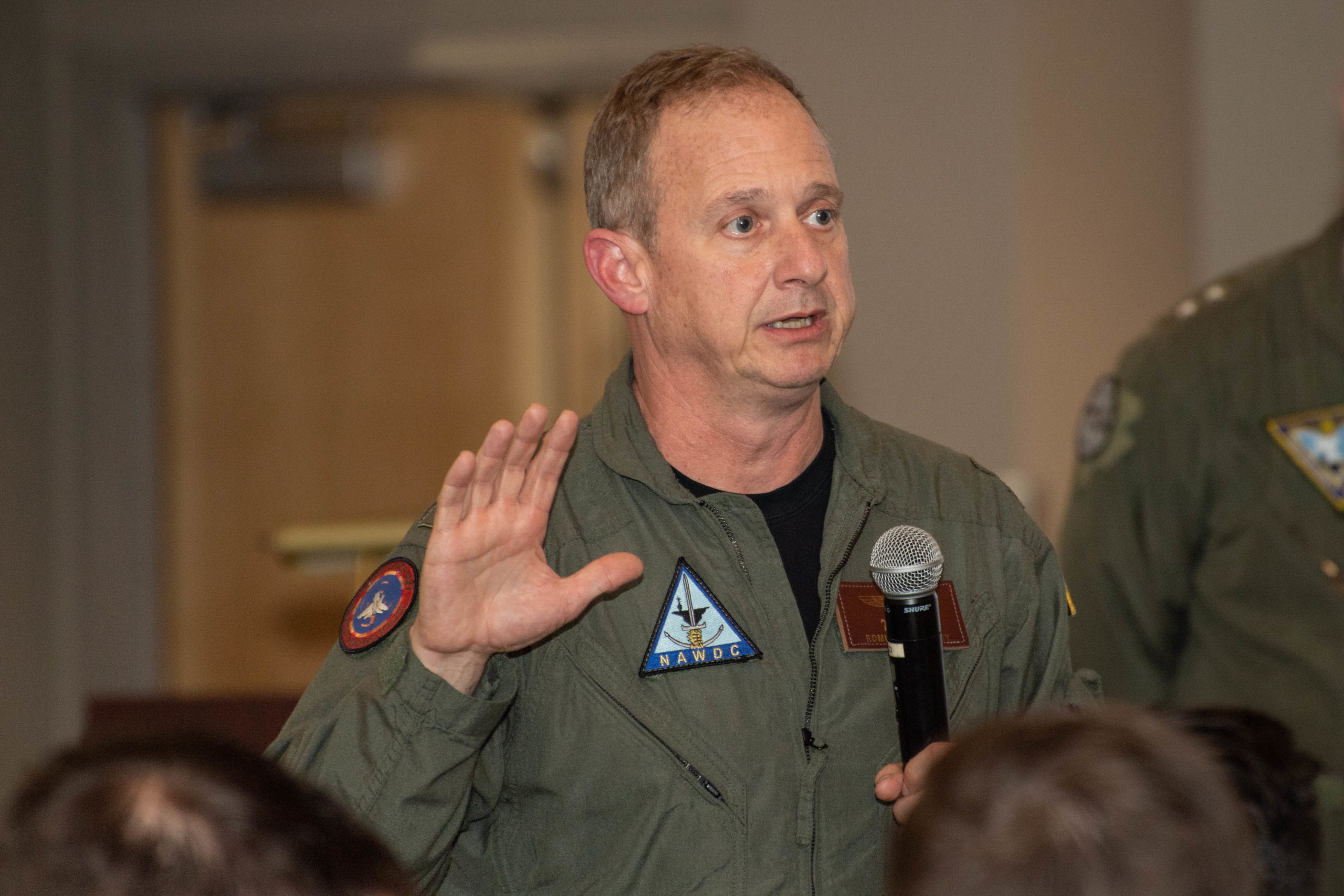Training for the High End Fight: The Perspective from CSG-4
The Sailors and Marines of the U.S. Navy and Marine Corps team operate the most advanced weapons systems and platforms 24 hours a day, seven days a week. They deploy as integrated warfighting teams designed to operate with the joint services, partners, and allies. Today’s strategic realities underscore the mission and sense of urgency for Carrier Strike Group (CSG) 4 to train, mentor, and assess carrier strike groups, amphibious ready groups, and independent deployers to deter, defend, and if necessary, defeat the enemy in combat.
CSG-4’s vision is increasing the Navy’s warfighting advantage to win the high-end fight through the deliberate development of warfighting capability on a foundation of tactical expertise guided by root cause analysis. This focus directly supports the Secretary of the Navy’s strategic guidance, the Chief of Naval Operations’ Navigation Plan, and Distributed Maritime Operations Concept, and it is realized along five lines of effort – Integrated Warfare; Live, Virtual, Constructive (LVC) training; Fleet Response Training Plan (FRTP) alignment; Assessment; and Requirements Development.
The command’s core mission to train, mentor, and assess integrated maritime forces for worldwide assignment is informed by the current and projected strategic security environment. Recent armed conflicts remind us of the imperative for naval forces to train to any threat environment they may encounter, and underscores the complexity facing commanders leading teams from the East Coast who may operate in the U.S. Sixth, Fifth, or Seventh Fleet areas of operation. Each natural, security, and defense environment around the globe has its own unique challenges in all warfare domains. Current conflicts also emphasize the importance of relationships with allies and partners and the trust built through combined training exercises.
Maritime diplomacy and integration are a priority in CSG-4’s pre-deployment training. In 2020, Allied Vision NATO training events were incorporated into Composite Training Unit Exercises (COMPTUEX). The support of U.S. and NATO operational commanders has been critical in developing the program to include direct engagement with Naval Striking and Support Forces NATO (STRIKFORNATO) in Lisbon, Portugal. These efforts directly contribute to interoperability in the Euro-Atlantic region, and perhaps more importantly, develop the personal and professional relationships between units and Sailors that deliver the ability to operate cohesively at the speed of trust.
Reflective of the rapidly evolving nature of integrated warfare, CSG-4 works across the Navy and Joint team to increase Joint All Domain Command and Control (JADC2) capacity for the high-end fight. The CSG-4 headquarters along with subordinate commands at Tactical Training Group Atlantic (TTGL), Expeditionary Warfare Training Group Atlantic (EWTGL), Training Support Vessel Squadron (TSVRON) 4, and CSG-4 Navy Reserve units are rapidly developing and informing an LVC training environment that will accelerate tactical and operational warfighting capability. CSG-4 employs Live, Virtual, and Constructive (LVC) training in each COMPTUEX, as well as integrating LVC into training opportunities throughout the deployment training cycle. LVC is a transformative capability that increases readiness through high-fidelity, rapid learning from the individual watch stander to the carrier strike group commander.
CSG-4 partners with Type Commanders, CSG-15, and the Navy’s five Warfighting Development Centers (WDC) to increase tactical proficiency earlier in the training cycle, while also meeting Distributed Maritime Operations (DMO) goals for high-end fight capabilities. Each of the WDCs were founded on the hard-earned legacy of TOPGUN and the Naval Aviation Warfighting Development Center. And further, each is moving rapidly to deliver integrated warfighting capability since the model expanded from aviation to undersea, information, surface, mine, and expeditionary warfare communities in the past decade. Continued investment and development of each of the WDCs informed by Fleet Commander training exercises is required to pace strategic competitors.
Similarly, CSG-4 works closely with II Marine Expeditionary Force’s Expeditionary Operations Training Group (EOTG) to align and synchronize Blue-Green team training which supports naval integration and DMO goals. This effort goes beyond Composite Unit Training Exercises (COMPTUEX) and is integrated into events such as Large Scale Exercises 21 and 23. CSG-4 also takes every opportunity to incorporate in-service teammates from Naval Special Warfare and Navy Expeditionary Combat Command, as well as the joint force.
CSG-4 operates as a supporting command in service to the Fleet – Sailors, Marines, and their families. To borrow from U.S. Special Operations Command – humans are more important than hardware. This is a warfighting imperative. History teaches that the greatest tactical – and strategic – advantages are the corporals, petty officers, first lieutenants, and lieutenants junior grade capable of leading in conflict and who comprehend the significance of their role in our naval force.
CSG-4 will continue to push the training envelope. The teams at CSG-4’s headquarters, TTGL, EWTGL, TSVRON 4, and our CSG-4 Navy Reserve units are actively engaged in training, mentoring, and assessing carrier strike groups, amphibious ready groups, and independent deployers to deter, defend, and if necessary, defeat the enemy in combat. CSG-4 will continue to work as if today is the last day of peace.
Published January 3, 2024 on DVIDS.
Featured Photo: NAVAL AIR STATION NORTH ISLAND, Ca. (Mar. 1, 2022) Rear Adm. Max McCoy, commander, Naval Aviation Warfighting Development Center, speaks at the 3rd Junior Officer Training Symposium (JOTS) at Naval Air Station North Island, California.

